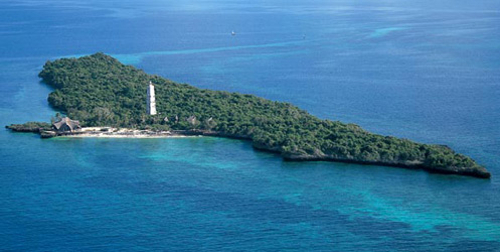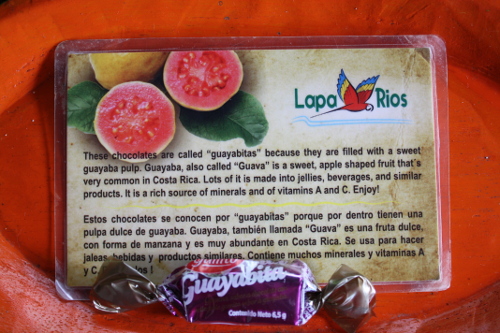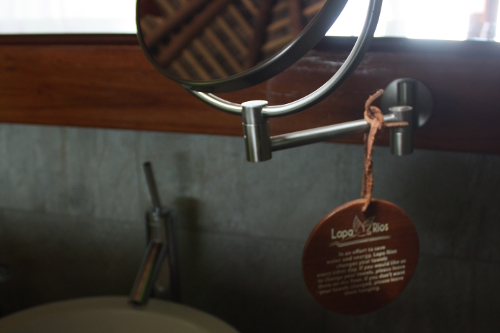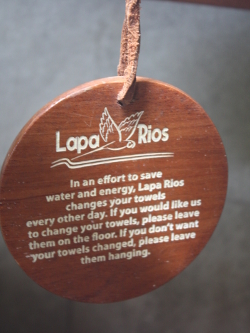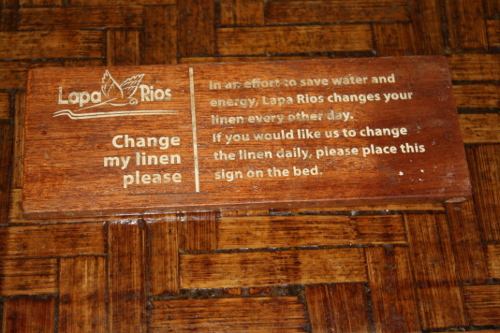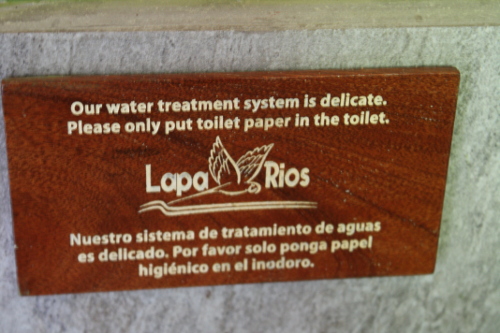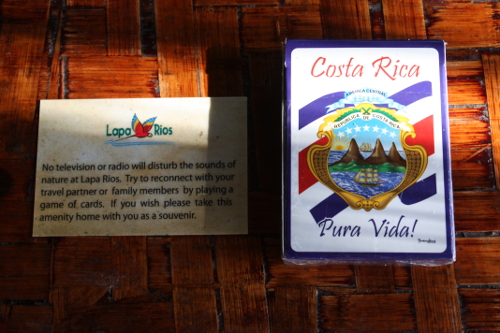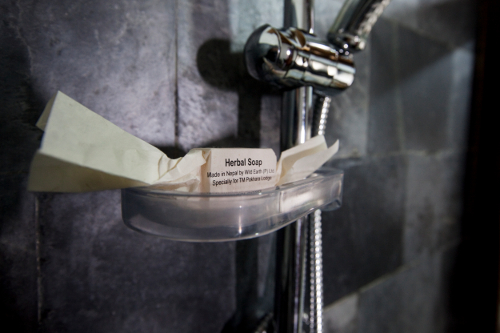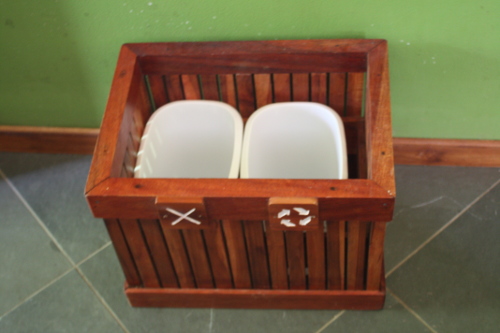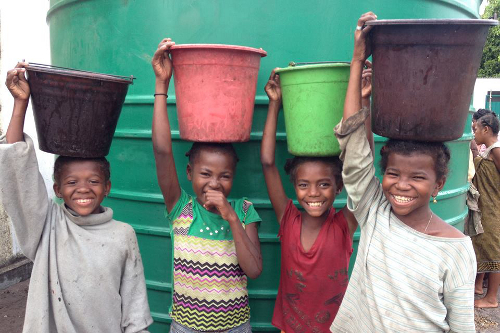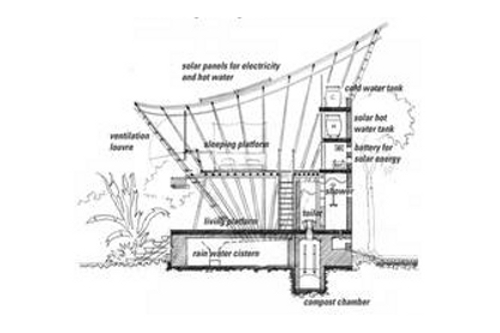Zero Waste in Hotels
/We thought we’d let you know what practical and cost effective steps hotels can take to minimise waste, so you can be on the lookout for places that are doing all they can for #ZeroWaste - or arm you with ideas for their feedback forms where you see that they could improve!
Of course, we hope you are following our 5 Rs for more Sustainable Tourism to Refuse, Reduce, Reuse, Repurpose and Recycle your own waste when travelling!
Doing more with less waste is becoming increasingly important in the world, so much so that ‘Sustainable Production and Consumption’ has been named as UN Sustainable Development Goal #12.
And it is really in the interest of hotels to reduce waste to reduce inefficiencies and costs, especially as waste disposal costs are likely to increase in the future due to diminishing landfill space and increasing collection and disposal costs.
Most of Earth Changers’ Places minimise waste, as they are concerned about resource use especially in their areas of conservation and/or without municipal waste disposal. As such, they may have to manage waste disposal themselves, so it’s of paramount importance, not just economically, but to minimise its social and environmental impacts, to not negatively affect health or wildlife.
> Can you imagine being Chumbe Island (above)? What do you think they do with waste?
As the world's first private protected marine park, materials imported onto the island are carefully screened to avoid any non-indigenous elements intruding into this spectacularly preserved environment. Only biodegradable detergents and soaps are used and laundry is washed off the island. The purchase of non-biodegradable products is avoided. Non-biodegradable waste has to be removed from the island. Guests - if you bring rubbish, please take it back home with you!
With thanks for contributions from Patricio Gonzalez Morel via our affiliate partner The Long Run.
A bit of background: Benchmarking
In order to understand how they might reduce waste, hotels need to understand how much waste is currently being produced. They can then create themselves a benchmark against which they can measure progress.
A European Commission study of 135 mid-range hotels in 2010 suggested waste was an average amount of
1kg of waste per guest night
- approximately double that of local residents (IFC, 2007). Resort hotels were shown to create the highest amount of waste, approximately 6kg/guest night!
(We suspect it has since risen with increased production and consumption, before we see it reduce again with minimising or #zerowaste efforts.)
> The study suggested aiming for a target benchmark of excellence of ≤0.6 kg waste per guest-night, based on the achievable level of the top 10% of hotels in the study.
Waste isn’t rubbish – actually it’s quite valuable and expensive, because we pay for it twice - when we buy it, and again to dispose of it (if not directly, possibly in taxes or time and effort personally).
Waste minimisation is the best strategy: if we don’t produce it in the first place, we don’t have to deal with it and pay for it again later. It makes financial sense if nothing else.
Sorting: Waste Types
To determine where waste can be reduced, you need to look at what you throw away and what you buy: In hotels it’s all about lots of details of many sources of waste across the hospitality sphere.
Waste, sorting and disposal does vary considerably across hotels but tends to be:
Organic
Glass
Paper and cardboard
Plastic
Metal
Hazardous
Residual – what is left, not recyclable, re-usable or compostable.
Hotels where waste sorting, disposal or recycling facilities are limited sees higher residual waste go to landfill.
> Tiger Mountain Pokhara Lodge in Nepal ‘s fragile mountain environment has a significant waste management and recycling program including metal, oil, glass, bottles, aluminium, copper and brass, plastics, cloth, batteries, Iron and steel, food and paper!
Actions hotels can take to avoid and minimise waste
Prevention is better than cure. Straightforward, simple alternatives (often going back in time to ‘old fashioned’ ways) are usually available so needless waste need not be generated. Here’s a long list of unnecessary waste to look out for!
Guest rooms
Plastic water bottles: Often wastefully small, even more so covered in a hotel’s branded cover!
The smaller the guest room water bottle, the more expensive and wasteful it will be. The difference between the least and most costly option for 2 litres of water per guest per day can be $1800 per year per room! So it can save waste and a lot of money!
> Instead, water can be supplied in returnable, hotel-filled branded glass bottles, or even a whole large water dispenser.
> Tiger Mountain Pokhara Lodge provide guests with refillable flasks – great for keeping water hot or cold!
Tea & Coffee: All those sachets and pods…
> Guests could use loose coffee and tea, or loose tea bags if required, in sealed containers.
In-room drinking glasses and cups: Wrapped in plastic, put on napkins & coasters, with paper caps!
> It’s fine for cups and glasses to be clean and on a wipeable surface. It looks neater too.
> Hotels should choose durable coasters rather than paper ones.
Mini bars: A great source of waste!
> Products should be in returnable bottles where possible
> Or at least locally easily recyclable containers (aluminium cans, bottles)
> At Nikoi Island, there’s no minibars, to save energy consumption and noise pollution.
Fruit baskets & treats: Often crazy-plastic-wrapped!
> A fruit bowl, local craft dish or biscuits or chocolates on a glass bell jar plate is fine!
Gifts and souvenirs: Excessively wrapped standardised ‘gifts’ don’t impress much!
> Hotels could opt for local crafts and local treats which will be appreciated.
Guest room communications: Do you need letters from managers let alone in envelopes? Surely door-hanging cards or bathroom notices can get less frequently damaged to reduce waste?
> Digital screen or small notes suffice, but a nice greeting in arrival in person is better.
> Important notices can be framed or laminated to last longer
> Local crafts people can create localised culture door-hang signs.
Guest room newspapers: There's really no need to wrap in a hotel plastic bag!
> Use nothing, a linen bag, or even a reuseable basket.
Guest room slippers: Are they needed? What a waste to provide ‘disposable’ single use versions!
> Jute slippers are compostable; standard flip-flops can be cleaned; or provide none!
> Locals often make slip on shoes from upcycled materials. Why not provide and/or sell those?
Toiletries: Individually wrapped soaps and shampoos are such a waste! Studies by Scandic hotels and Accor have shown 70-85% packaged bathroom amenities end up in waste - product and packaging! It's madness!
> Soaps need perhaps only a paper band around; and used returned to manufacturers
> Replaced with locally made attractive dispensers, guests use only what they need.
> Hotel concerns over breakages, tampering and dilution can use ‘lockable’ anchors.
> Hotels could aggregate part-used toiletries and refill: a lot or work, but saves waste; bulk buying in 5l containers can save over 50% cost of shampoo in small disposable bottles.
> Hotels shouldn’t remove part-used toiletries part-way through a guest’s stay.
> Additional toiletry items can be made on-request only.
Guest room bins: Plastic bags in bins, especially over-large ones, are wasteful and unattractive!
> If need be where used, use small, biodegradeable bags and replace only when soiled.
> Instead, hotels could use attractive local craft-made bins, preferably washable.
Guest recycling: The simpler the better to get people to do it!
> Hotels are better to provide 2 bins for Recyclable or Not, with housekeeping sorting further.
Guest room towels & Linens: Too often these are replaced when guests don’t require, and taken for cleaning in unnecessary, thin single-use plastic bags!
> Housekeeping need to enforce the towel reuse policy: guests should report if ignored!
> Hotels can use housekeeping carts, bag-carts, wheeled garbage bins, even modified wheelbarrows for exterior rough terrain.
> Hotels should verify suppliers use water and energy efficient laundry processes.
Guest laundry: Hotels used to protect returned clothes with plastic bags too!
> No bag, cloth bags or a basket can suffice. (Guests please don’t help yourselves to laundry bags, it only encourages single-use plastic ones!)
A study on the use of ‘disposable’ large plastic bags in a particular hotel showed 1500 were used per room per year, costing $80 per room per year! A few simple changes could reduce this by 75% or more!
Cleaning Products: In most consumer versions, few ingredients are active, they are mostly propellant and water.
> It’s better therefore for hotels to minimise waste by buying in concentrate form, properly diluted so as not to waste concentrate, and put into refillable containers.
> Hotels can minimise hazardous chemical use and waste with eco organic versions.
Batteries: Can be an issue in hotels as they are a hazardous material, often not recyclable locally. Batteries are also a wastefully expensive form of energy as opposed to the grid!
> Hotels should avoid batteries and use hard-wired or wind-up devices (eg. torches) instead if possible, or at least rechargeable batteries.
In the Food & Beverages department:
Tableware: ‘Disposable’ tableware and plastic cutlery is not a nice customer experience! Whilst they might not cost much per unit, it’s just money getting wasted, literally!
> Durables (glass, metal, plastic) are more expensive initially but save waste and money over time.
> Eco-friendly disposables (paper, wood, bamboo, natural fibres)
NB. Bioplastics from renewable resources like cassava starch, or ‘biodegradable plastics’ may break down faster but still have problems of local compostability and recyclability.
> Chumbe Island, Tanzania avoid the purchase of non-biodegradable products: all non-biodegradable waste is removed from the island and, where possible, recycled.
Straws: Plastic straws really aren’t necessary now there are so many alternative options available:
> Choose no straws, stainless steel (preferably with a rounded tip so not sharp), bamboo (can even be produced locally but last long), paper (although they go soggy), or edible.
> At Nikoi Island, a member of staff makes their own bamboo straws.
Single portion packages: You get little product compared to the amount of waste, presentation is generally terrible, and the smaller the package, the greater the cost for the product!
> Products like butter, jam can be put in attractive dishes.
> Condiments can go into refillable bottles and cereals into mason jars.
Napkins: May be a surprise! In an analysis considering production, manufacture, washing and environmental impact:
Cotton napkins create over one kilo of greenhouse gas emissions and use 150 litres of water
Linen napkin cause 112 grams of GHGs and use 22 liters of water
Paper napkins create 10 grams of greenhouse gas emissions and uses 0.3 liters of water.
Whist reusing and rewashing napkins would reduce emissions-per-use over time, each wash adds incremental electricity emissions and water which is roughly 50% that of new paper napkins, which could make linen reuse better than paper on napkin full life cycle analysis, but is unlikely for cotton napkins ever to be ‘emissions-effective’ over paper.
> In catering, paper napkins are likely the best solution
> At home, re-using linen napkins several times between washes could become emissions-effective in the long term.
>
Drinking water: plastic bottles are becoming a thing of the past, many hotels now
> Carbonate their own water
> Fill refillable, sometimes branded, glass bottles or jugs.
If you'd like your own water-filtration-system-in-a-bottle, check out our partnership and discount code with Water-To-Go.
Food waste: A high cost routinely wasted in hospitality! 34% comes from customer plates, but the majority from kitchens in preparation (45%) and spoilage (21%).
> Hotels can reduce the amount of food they make available, such as buffets and excess portion sizes, and/or can cook to order.
> Guests need not be served with all elements of a meal in case they don’t want it, but enabled to choose what they wish.
> At Nikoi Island in Indonesia, the menu is fixed and seasonal to reduce food waste. They also reuse cooking oil for tiki lamps to light pathways at night so as to not disorientate nesting turtles.
> Hotels can donate reduced waste to local staff or community; it may support Sustainable Development Goal #2: End hunger, achieve food security and improve nutrition.
> In Costa Rica and Nicaragua, food scraps from the kitchen are fed to the pigs whose methane is collected to fuel the staff kitchen stove!
> Kitchens should also have water and energy management plans in place.
Food wrap: Cling film and aluminium foil are popularly used and not recyclable!
> Beeswax wraps can be a useful alternative, which you can even make yourselves, although hotels have to be careful as some vegans don’t like the exploitation of bees.
Packaging waste: In buying food, hotels don’t need unnecessary packaging, plastic bags and wrap!
> Food produced from natural local ingredients not bought doesn’t need packaging and tastes better too!
> Shopping can select low packaging products put in reuseable crates and durable bags, or suppliers that use returnable packaging.
> Lapa Rios in Costa Rica verify supply chain distributors for environmental standards such as these and encourage all other local businesses to do so!
Food miles: Can create a waste of fuel, vehicle degradation, and food quality.
> The less the distance food travels, the better and the less costly.
> Chumbe Island food comes from local produce to minimise waste, packaging, processing, pollution and food miles, transported in locally made, biodegradable baskets.
Water Use
Dwindling supplies of water is a major problem impacting every continent, especially safe drinking water. Whether in developing or developed countries, islands surrounded by water or other holiday destinations, tourism water use often far out-strips local use: not just drinking, showers & cooking, think swimming pools, gardens and golf courses.
> Tourism operations can be developed to be self-sustainable from rainwater catchment, and even support communities with water like in Nicaragua.
> Wastewater generated in the destination should be reused where possible or treated before discharge.
> Read our article on Sustainable Development Goal #6, Clean Water & Sanitation.
Energy Use and waste
Hotels can be designed from the start with sustainability at core to waste less energy, and reduce emissions that contribute to climate change.
> Raised rooms such as found at Chumbe Island and Nikoi Island can create natural air conditioning without the need for electricity.
> Tourism can be a driver for infrastructure for local energy generation and efficiency.
> Read out article on Sustainable Energy, Sustainable Development Goal #7 for more
Have you spotted anything else a real waste in hotels?
Let us know and let’s suggest #zerowaste alternatives!

